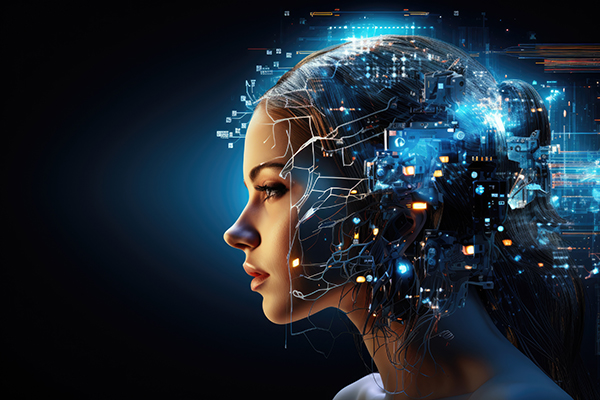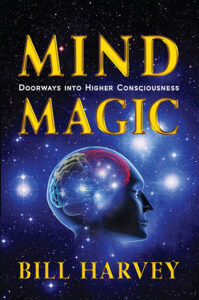Welcome to this week’s Bill Harvey Blog: July 19, 2024

As I was growing up, I was constantly studying my own mind. This was natural to me and then it was accelerated by my experiencing Flow state, mostly during some stage performances starting at age four.
I didn’t have a name for it other than describing it as “perfect performance as if doing itself.” There were other attributes I didn’t talk about because I knew they were taboo, such as the feeling that these experiences were otherworldly and suggested “magic” or the “supernatural”, which I repressed as I had decided that science was everything and that religion was merely superstition. I eventually revised the latter decision based on experiencing the spiritual level of Flow state.
I wanted to regain the “perfect performance” state and maintain it all the time. This motivated me to pay even more attention to what was going on in my mind at all times, and to relate that activity to the external world experiences I was having at the same time. I sought to relate states of my mind to the positive or negative feedback I was getting from other people and things.
The first “validation” that this strange “perfect” state existed came when I confessed my experiences to my favorite comedian of the era, Jack Carter. He said, “Oh sure, Billy, everyone in show business has that sometimes, it’s called ‘being on’.”
Mihaly Csikszentmihalyi coined the term “Flow state” when he studied the phenomenon as head of the psychology department at the University of Chicago. His first published work on the subject came out in 1975.
My first published work was written in 1972 and its subject matter was what I had learned about the states of my mind. It came out as the book Mind Magic in 1976. Throughout the book I referred to a part of the mind as “the robot”. This was the part of the mind that generated some of my actions that yielded the most negative results in the external world. The robot I had deduced was keeping me out of the “perfect” state (Flow state).
I knew that this automatic part of myself was making predictions. The following passage appears on pages 48-49 of Mind Magic:
 “When you are about to see something, your mind automatically searches your memory for a comparable object (note the distinction between you seeing something and your mind having already seen it). If your mind finds something similar enough, it projects the stored image onto the new object so that you do not ever see the new object, but are merely dimly aware that there is a familiar type of object there… As a result of this, you mostly do not perceive your environment, instead perceiving mostly what you expect to perceive, i.e. you usually see your mind’s prediction.”
“When you are about to see something, your mind automatically searches your memory for a comparable object (note the distinction between you seeing something and your mind having already seen it). If your mind finds something similar enough, it projects the stored image onto the new object so that you do not ever see the new object, but are merely dimly aware that there is a familiar type of object there… As a result of this, you mostly do not perceive your environment, instead perceiving mostly what you expect to perceive, i.e. you usually see your mind’s prediction.”
The term “artificial intelligence” and its abbreviation as “AI” appeared in 1955 in a project proposal by John McCarthy, Marvin Minsky, Nathaniel Rochester, and Claude Shannon. I became aware of the term as an avid sci-fi reader and began using it in my own sci-fi writing in the late 70s. In 1979 I formed one of the first neuroscience companies in the marketing field (Psychophysiological Research Management, PRM), partnering with Dr. Richy Davidson and Dr. Dan Goleman. Sometime thereafter, I began to use the term “bio-AI” as synonymous with “the robot”.
In 2002, Dr. Karl Friston published his first work on “active inference” in which he proved the existence of the prediction engine in the brain which I had introspected in myself a half-century before it became scientifically recognized. Friston’s work with many other scientists has identified the prefrontal cortex as being involved in the automated calculations often occurring below the level of consciousness. That suggests we have only had the bio-AI for about 200,000 years, for that is when the prefrontal cortex appeared.
After William James, psychology had become disenchanted with the use of introspective evidence, because of the tendency to bias and inaccuracy. However, the fact that in modern times an individual was able to predict science decades in advance by the careful use of introspection, strongly suggests that introspective evidence be reconsidered as a tool of psychology.
A few pages later in Mind Magic on page 53 it says:
“…society communicates expectations to you which you then see in place of seeing the realities themselves.”
This theme recurs throughout the book, emphasizing that cultural biases are conditioned into the bio-AI. This explains why brainwashing by social media, media “news”, parents and peer pressure is so powerful: it slips into the bio-AI inference engine below the level of consciousness.
We as a species are at a crossroads. The pro-survival bio-AI which enabled us to evade superior predators 200,000 years ago today often functions as contra-survival, as I discovered as a child by allowing my automated reactions to play out in the real world, which often resulted in negative results. The chaos into which the entire world has fallen today, to me, points to the urgent need for rapid widespread education of a new kind, teaching people how to bring decision making into the sphere of the conscious mind, what I call metacognition (term coined by John H. Flavell) and my partner Dr. Gerald Zaltman calls open-mindedness.
My interests in introspection and in neuroscience are connected to one another. My life’s work is to make the connections between the discoveries of neuroscience and the subjective inner life of the individual that will enable science and education to work together to cause most human beings to be able to spend most of their time in states of metacognition/open-mindedness and Flow. If we as a species can accelerate this process of what I call “psychotechnology” or “microcosmology” we can deter the drift back into the self-administered Feudal slavery of inviting “strong men” to take over our governance and protection. It’s never too late.
We all know how difficult it is to control the mind, to master oneself. Socrates said, “Know Thyself,” and Plato said, “I still do not know myself, so why would I spend time studying anything else?” (Phaedra) The only control panel or dashboard life gives us for achieving this task is the user interface (UI) we call the mind. The conscious mind experiences “qualia”, subjective experiences within consciousness, including words, images, snatches of memories, and especially feelings. We have control over certain things through this UI. We can choose to slow down our breathing, engage in positive imagination, question our attachment to certain outcomes, use reasoning and evidence, and these and many other tactics are within the sphere of our control. In this introspective world, we have the only chance we will ever get to solve our problems or to see that they are opportunities. Therefore, we cannot Behavioristically study only structure and function of the brain, we need to relate events at the physical level to the qualia at the mind level, or else we lose the value of having that control panel inside.
My best to all,
![]()

Awesome piece, Bill?
Chuck